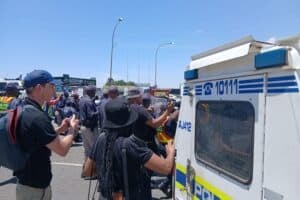South Africans are about to find out what happens "when you destroy your infrastructure in the name of politics,” since KwaZulu-Natal and Gauteng contribute more than half to the country's GDP.

In just one week of rioting and looting, the economies of KZN and Gauteng have been knocked back to the same slump of lockdown level 5, meaning there is no way investors would look to the country positively, economists have warned.
It is predicted that the country’s GDP growth will come in at 0.4 percentage points lower this year due to the carnage and destruction to property being most rampant in KwaZulu-Natal and Gauteng, the two provinces which contribute more than half to the South Africa’s GDP, said PricewaterhouseCoopers (PwC) chief economist Lullu Krugel.
The coastal province is home to the Port of Durban, which carries 65% of the country’s container traffic, while Gauteng is the largest regional economy in the country.
ALSO READ: Sasria already gearing up to pay out protest-related claims
Economies in a virtual level 5 lockdown
“From our perspective, these events essentially placed key areas of the Gauteng and KwaZulu-Natal economies in a virtual level 5 lockdown – many retail shops were closed; interprovincial transport ground to a halt; diverse places of work were unable to open as normal and citizens, afraid for their safety, stayed at home,” said Krugel.

“We considered the impact of a one-week level 5 lockdown on the retail and transport industries of Gauteng and KwaZulu-Natal. Our calculations show that national GDP growth could be 0.4 percentage points lower this year due to this week of significant disruption.”
Investors might start looking elsewhere
Despite the country just inching closer to normality after the worst of the pandemic, the riots have inspired investors to look elsewhere until there is assurance the instigators behind the mayhem are brought to book, said chief economist Mike Schussler.
But in the meantime, there is no way there would be any fixed and capital investment on any large scale for a long time, he said.
“Investors are not coming, foreign or local, right now. There is no way. It is going to take months, if not years, to turn that sentiment around. I think if we learn lessons from this, we can turn it around.”
To gain investor confidence, government should rather find and publicly prosecute the instigators behind the recent riots.
“This is unchartered territory for the country and its people. Whoever is instigating this and is behind this needs to be brought to book before businesses start thinking about investing again. If they don’t know what happened and there is no investigation, it is difficult to see any business person investing.”
“No investor is really interested in the small petty looter. What they want to know is what is will be done to make this not happen again,” Schussler said.
More poverty looming
Rebuilding the damaged property might create short-term employment for those in construction, but unemployment is going to increase.
Schussler believes the impact of the chaos could be even worse than it was under the worst of last year’s lockdown.
“This is probably a shock but as big, if not bigger than lockdown level 5. That is the scale I would put it in – and this was instituted in less than a week.”

It was the youth that are particularly affected by joblessness, which explains why it is young men and women who are at the forefront of the looting, political analyst Professor Barry Hanyane said.
“That in itself drew a picture to say that perhaps the issue of unemployment may very well now be a runaway train.”
“The biggest fallout will be on issues of poverty. You loot today, and tomorrow, because of lack of supply chain, you can’t get fuel because refinery trucks are parked in Durban and are afraid of being damaged when getting to Soweto, where they are not sure whether they will be safe or not. For the first time since 1994, we are going to feel the wrath of what happens when you destroy your infrastructure in the name of politics.”
Ramaphosa’s government will survive
While Hanyane believes the riots were meant to destabilise government under the leadership of Cyril Ramaphosa, while he also is also facing criticism for a slow vaccine rollout and Covid-19 response, he was of the opinion that too much faith should not have been placed in the president in the first place.
“Maybe the attachment that Cyril Ramaphosa is the next Moses is over inflated. He is not. Ramaphosa cannot deliver us into the promised land. Civil society must pull its own strings.”
But the President would survive this and could possibly even serve another term, as there is no one within the governing party to take his place, said Hanyane.
“He is going to have his term. The irony is that you find within the ANC that if he goes, there will be a bigger problem than when he is there. Who in the top six enjoys similar credibility? It got boosted with the victory he got of the Constitutional Court ruling on the CR17 election funding. It’s a moral and credibility boost.”






